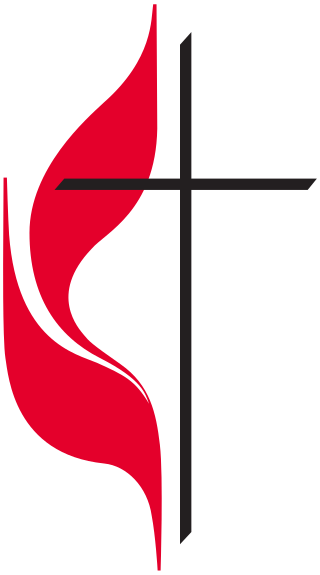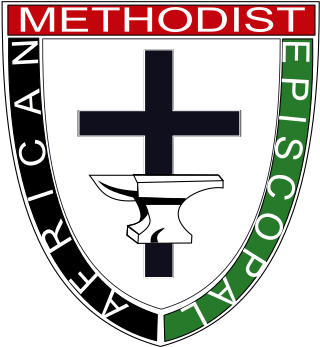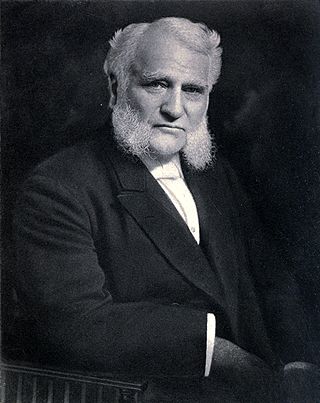Methodism, also called the Methodist movement, is a group of historically related denominations of Protestant Christianity whose origins, doctrine and practice derive from the life and teachings of John Wesley. George Whitefield and John's brother Charles Wesley were also significant early leaders in the movement. They were named Methodists for "the methodical way in which they carried out their Christian faith". Methodism originated as a revival movement within Anglicanism originating out of the Church of England in the 18th century and became a separate denomination after Wesley's death. The movement spread throughout the British Empire, the United States and beyond because of vigorous missionary work, and today has about 80 million adherents worldwide.

The United Methodist Church (UMC) is a worldwide mainline Protestant denomination based in the United States, and a major part of Methodism. In the 19th century, its main predecessor, the Methodist Episcopal Church, was a leader in evangelicalism. The present denomination was founded in 1968 in Dallas, Texas, by union of the Methodist Church and the Evangelical United Brethren Church. The UMC traces its roots back to the revival movement of John and Charles Wesley in England, as well as the Great Awakening in the United States. As such, the church's theological orientation is decidedly Wesleyan. It embraces liturgical worship, holiness, and evangelical elements.

An episcopal see is, in a practical use of the phrase, the area of a bishop's ecclesiastical jurisdiction.
The Methodist Episcopal Church (MEC) was the oldest and largest Methodist denomination in the United States from its founding in 1784 until 1939. It was also the first religious denomination in the US to organize itself nationally. In 1939, the MEC reunited with two breakaway Methodist denominations to form the Methodist Church. In 1968, the Methodist Church merged with the Evangelical United Brethren Church to form the United Methodist Church.

The African Methodist Episcopal Church, usually called the AME Church or AME, is a Methodist Black church. It adheres to Wesleyan-Arminian theology and has a connexional polity. The first independent Protestant denomination to be founded by Black people, AME welcomes and has members of all ethnicities.
Connexionalism, also spelled connectionalism, is the theological understanding and foundation of Methodist ecclesiastical polity, as practised in the Methodist Church in Britain, Ireland, Caribbean and the Americas, United Methodist Church, Free Methodist Church, African Methodist Episcopal and Episcopal Zion churches, Bible Methodist Connection of Churches, Christian Methodist Episcopal Church, and many of the countries where Methodism was established by missionaries sent out from these churches. It refers to the way in which Methodist churches and other institutions are connected and work together to support one another, share resources, and carry out mission and ministry. The United Methodist Church defines connection as the principle that "all leaders and congregations are connected in a network of loyalties and commitments that support, yet supersede, local concerns." Accordingly, the primary decision-making bodies in Methodism are conferences, which serve to gather together representatives of various levels of church hierarchy.

The Reconciling Ministries Network (RMN) is an organization seeking the inclusion of people of all sexual orientations and gender identities in both the policy and practices of United Methodist Church. It is one of many Welcoming Congregation organizations to emerge in American Christianity in the 1980s. The ministry has over 1100 affiliated congregations and 42,000 affiliated individuals.

Joseph Crane Hartzell was an American Missionary Bishop of the Methodist Episcopal Church who served in the United States and in Africa.
A bishop is a senior role in many Methodist denominations. The bishop's role is typically called the "episcopacy", based on the Greek word episkopos (επισκοπος), which literally means overseer. Superintendent is another translation of episkopos but in Methodist churches this is a role distinct from bishop. The first Methodist bishops were appointed in America, and American Methodist denominations still recognize the office of bishop.
An annual conference is a regional decision-making body within various Methodist denominations. Conferences are a key characteristic of the connexional (connectional) system of government in Methodism. Annual conferences are composed primarily of the clergy members and a lay member or members from each charge. Each conference is a geographical division. In general, the smaller states in the United States hold one conference each, while larger states often include two or more conferences. Several annual conferences are held in other nations as well.
An episcopal area in the United Methodist Church (UMC) is a basic unit of this denomination. It is a region presided over by a resident bishop that is similar to a diocese in other Christian denominations. Each annual conference in the UMC is within a single episcopal area; some episcopal areas include more than one annual conference. Episcopal areas are found in the United States as well as internationally. In some cases, such as the Western Jurisdiction of the US as well as some places internationally, an episcopal area covers a very large territory.
Methodist viewpoints concerning homosexuality are diverse because there is no one denomination which represents all Methodists. The World Methodist Council, which represents most Methodist denominations, has no official statements regarding sexuality. British Methodism holds a variety of views, and permits ministers to bless same-gender marriages. United Methodism, which covers the United States, the Philippines, parts of Africa, and parts of Europe, concentrates on the position that the same-sex relations are incompatible with "Christian teaching", but extends ministry to persons of a homosexual orientation, holding that all individuals are of sacred worth.
The United Methodist Council of Bishops is the organization of which all active and retired Bishops in the United Methodist Connection are members. In the United Methodist system of polity, the Council of Bishops is the Executive Branch of United Methodist Church government.
The Philippines Central Conference of the United Methodist Church is a collection of annual conferences of the United Methodist Church in the Philippines that are organised much like jurisdictional conferences in the United States. The Philippines Central Conference is considered a member church of the World Methodist Council, and a "Central Conference" of the world-wide United Methodist Church. It is also a member of the Christian Conference of Asia and the National Council of Churches in the Philippines as The United Methodist Church in the Philippines, representing the denomination as its Philippine counterpart.
The Jurisdictional Conferences are a collection of Annual Conferences of The United Methodist Church located inside the United States.

Methodist Church in India is a Protestant Christian denomination of India.
The Evangelical Methodist Church in Uruguay is a member of the World Methodist Council. It has 1,000 members and 12 congregations. It is also an autonomous affiliate of the United Methodist Church.
The United Methodist Church in Liberia is a member of the United Methodist Church, one of the world’s largest denominations. It is part of the Wesleyan Tradition, a methodical faith and practice started by John Wesley, whose father was a priest in the Anglican Church in England. The church today is found in almost all parts of the world including Europe, Asia, USA, and Africa. Liberia in Africa, is one of the many African countries where the United Methodist Church is established.
The Global Methodist Church is a Methodist denomination of Protestant Christianity subscribing to views consistent with the conservative Confessing Movement. The denomination is headquartered in the United States and has a presence internationally. The Global Methodist Church was created as a result of a schism with the United Methodist Church, after members departed to erect a denomination seeking to uphold "theological and ethical Christian orthodoxy." Congregations that left the UMC to form the Global Methodist Church opposed recognition of same-sex marriage and the ordination of non-celibate gay clergy. Its doctrines, which are aligned with Wesleyan-Arminian theology, are contained in the Transitional Book of Doctrines and Discipline, its Book of Discipline, and in The Catechism of the Global Methodist Church. As of 2024, the church says it is composed of nearly 4,500 congregations and pastors.





